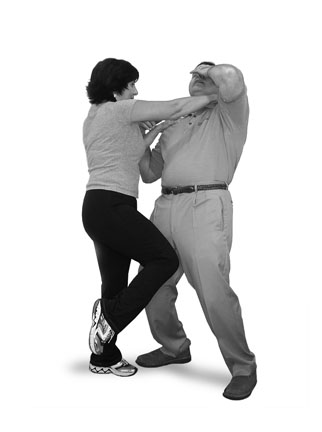If you decide to enter the police force or military, you’ll need to learn self-defense. If you are worried about your personal safety, self-defense classes could help. Here is a glossary to help you talk and write about the concepts of self-defense in English.

Glossary
- block
- Hinder or stop the movement or action of (an opponent, a ball, etc.).
- concentration
- The action or power of focusing one’s attention or mental effort.
- danger
- The possibility of suffering harm or injury.
- danger sign
- An indication that a bad or dangerous situation is likely to develop.
- enemy
- A person who is actively opposed or hostile to someone or something.
- feint
- A deceptive or pretended blow, thrust, or other movement, esp. in boxing or fencing.
- fighting
- The action of fighting; violence or conflict.
- force
- Strength or energy as an attribute of physical action or movement.
- guard position
- The guard is a ground grappling position where one combatant has their back to the ground, while attempting to control the other combatant using the legs.
- hit
- Bring one’s hand or a tool or weapon into contact with (someone or something) quickly and forcefully.
- hurt
- Cause physical pain or injury to someone.
- judgement
- The ability to make considered decisions or come to sensible conclusions.
- martial art
- Various sports or skills, mainly of Japanese origin, that originated as forms of self-defense or attack, such as judo, karate, and kendo.
- mind
- The element of a person that enables them to be aware of the world and their experiences, to think, and to feel; the faculty of consciousness and thought.
- move
- Go in a specified direction or manner; change position.
- muscular endurance
- Endurance is the ability of an organism to exert itself and remain active for a long period of time, as well as its ability to resist, withstand, recover from, and have immunity to trauma, wounds, or fatigue. In humans, it is usually used in aerobic or anaerobic exercise.
- observation
- The action or process of observing something or someone carefully or in order to gain information.
- precision
- The quality, condition, or fact of being exact and accurate.
- self-defense
- The defense of one’s person or interests, esp. through the use of physical force, which is permitted in certain cases as an answer to a charge of violent crime.
- sidestep
- A step taken sideways, typically to avoid someone or something.
- speed
- The rate at which someone or something is able to move.
- suppleness
- The gracefulness of a person or animal that is flexible and supple.
- technique
- A skillful or efficient way of doing or achieving something.
- unbalance
- Make (someone or something) unsteady so that they tip or fall.
- weak spot
- A place of special vulnerability.
